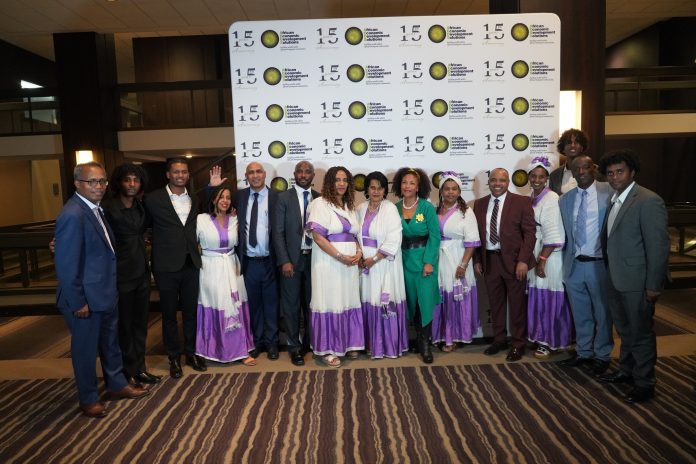

After three successful conventions, African Economic Development Solutions (AEDS) returned for the annual African Leadership Conference. The theme for this year’s event, which was held virtually on Dec. 8, was “African Immigrants’ Challenge in Wealth Building Efforts.” Panelists from across the nation explored strategies for African immigrant economic prosperity.
“This is a space where we can share information and build a network across the U.S.,” said AEDS President Gene Gelgelu.
AEDS works by linking African immigrants in Minnesota’s Twin Cities metro area to resources to help them attain home ownership, build businesses, and achieve financial security. The leadership conference brings together African immigrant officials and leaders from across the state to address economic disparities.
Minnesota has some of the widest racial disparities in economic achievement in the country. The state has the second largest income inequality gap between Blacks and whites in the nation – second only to the District of Columbia. Many African immigrants in Minnesota lack the necessary resources and connections need to improve their economic well-being and close the wealth gap. By bringing together African immigrants and leaders, AEDS hopes to gather ideas on how the community can speed up addressing economic inequalities.
A key theme was the idea of entrepreneurship as an avenue of upward mobility. Panelists discussed the advantages of owning a business over working traditional jobs, including increased professional freedom. But they also nodded to the potential challenges of immigrant entrepreneurship. Business owner Margaret Dureke said that it was important to nurture entrepreneurial talent in the community by being supportive.
“We need to push the people who want to become entrepreneurs,” Dureke said. “We need to become financially independent.”
AEDS Director Idris Mohamed said many African newcomers struggle to acclimate to cultural changes as they navigate establishing their businesses in a new country.
“Many of us ran businesses back in Africa but came here unprepared because the way it’s done here is very different,” Mohamed said.
One way Africans could adjust, Mohamed said, was to embrace small business educational programs. By seeking training, African immigrants could familiarize themselves with American business practices, he said. One thing nonprofit director Hibo Abdi wants to see in trainings is a focus on technology education.
“A lot of the younger immigrants are tech savvy but the older generations are left behind,” Abdi said.
Amidst the optimism around entrepreneurship, professor Sombo Muzata, an assistant professor of Political Science at James Maddison University, urged Africans to remember the value of traditional schooling and careers. An MIT study found that lower profits and higher closure rates plague Black owned businesses, making entrepreneurship a risky endeavor for many Black people. Muzata said it was important to encourage entrepreneurial growth, while also being realistic about potential challenges.
“Not everyone is going to succeed as an entrepreneur, so education is our next best shot,” Muzata said.
But the dream of African immigrant prosperity could be futile, panelists said, if they did not first pour into the children. After all, they would be the ones to carry the torch when today’s business leaders retire. Beirut Abagofi, a policy aide for the City of Minneapolis, said that there was a direct link between the quality of children’s’ education and workforce readiness in adulthood, adding that it was crucial to prioritize polices that would support young African learners.
“For me the workforce preparation is deeply tied to the education system,” Abagofi said. “They need to align.”
Fortunately, African youth in America are doing relatively well. A Kansas University study found that immigrants aged 16 and over have an employment rate of 69%, six percentage points above that of the American rate.
Still, there are gaps. A report from the Migration Policy Institute revealed that despite being more educated, African immigrants earn less on average than immigrants from other regions. About 20% of African immigrants are said to be living below the poverty line. Film director Chuckwunonso Dureke, a child of Nigerian immigrants, said her upbringing taught her the value of African youths’ access to a strong internet connection.
“For African youth to have internet access in the 5G era would be powerful, you’re gonna need certain things in your hour to be able to keep up,” Dureke said.
Beverly Booker Ammah, an associate professor at Howard University, said there are obstacles such as forms of “unproductive” entertainment that prevent African immigrant youth. Ammah said she would like to see a shift in the interests of young Black youth, where appetite for pop culture is replaced by intellectual curiosity.
“It is key to have analytic discussions about what are those distractions and how youth and elders can dismantle them to move forward,” Ammah said.
Gelgelu thanked participants before concluding the conference, mentioning his anticipation for seeing guests in person in the summer of next year. But before everyone signed off, he reminded them why conferences like the National African Leadership Conference are important for the community.
“We think we are so resilient, but we have to remember we are navigating two cultures, our own and the one here,” Gelgelu said.
About Panashe Matemba-Mutasa, Mshale Reporter
Panashe is a general assignments reporter. She is a graduate of the University of Minnesota and a UC Berkeley Graduate School of Journalism Class of 2025.






